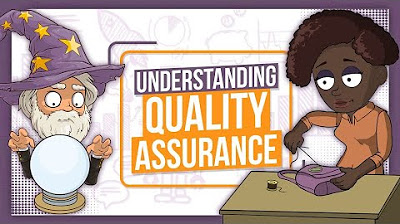Ep. 2: Quality Management Systems, Quality Control and Quality Assurance | Kellerman Consulting
Summary
TLDRIn this video, Brian Kerman, Chief Quality and Safety Officer at Kerman Consulting, explores Quality Management Systems (QMS) and the distinction between Quality Control (QC) and Quality Assurance (QA). He explains the role of QMS in ensuring the excellence of products and services, touching on ISO 9001 certification as a voluntary benchmark for quality. Kerman outlines the importance of a dedicated quality department, the responsibilities of QC and QA, and how organizations can achieve efficiency and consistency. The video stresses the need for strong leadership to prevent conflicts and ensure that quality remains a priority throughout the organization.
Takeaways
- 😀 A Quality Management System (QMS) is a set of actions, procedures, and improvements designed to achieve consistent quality in products and services.
- 😀 ISO 9001 is a voluntary international standard for QMS, widely respected but not mandatory for businesses to implement.
- 😀 Quality Control (QC) focuses on inspecting and checking products or services during or after production to ensure they meet quality standards.
- 😀 Quality Assurance (QA) is a more strategic function that ensures processes and systems are in place to prevent quality issues from occurring.
- 😀 A QMS is not a regulatory requirement, but it provides businesses with a framework to improve their operations and achieve conformity.
- 😀 Small businesses can handle QMS tasks with a single person, but larger organizations may need dedicated quality departments to manage complexity.
- 😀 QC roles typically involve hands-on inspections, such as checking product quality or reviewing service transcripts, to confirm correctness.
- 😀 QA roles are more involved with planning, risk assessment, training, internal audits, and ensuring corrective and preventive actions are taken.
- 😀 ISO 9001 does not mandate specific QC actions or departments, but it requires organizations to demonstrate effective control and confirmation of product quality.
- 😀 In larger organizations, QC and QA roles may overlap, with individuals performing tasks that involve both ensuring quality control and implementing quality assurance processes.
- 😀 Strong organizational leadership is crucial to ensure that quality departments can function independently from other business pressures and conflicts.
Q & A
What is the primary purpose of a Quality Management System (QMS)?
-The primary purpose of a QMS is to ensure the organization maintains quality in its products and services through planned procedures, actions, and improvements that are continuously reviewed and adjusted.
How does ISO 9001 relate to a Quality Management System?
-ISO 9001 is an internationally recognized, voluntary certification program that organizations can use to benchmark their QMS. It is not a mandatory requirement but is highly respected in many industries.
What is the difference between Quality Assurance (QA) and Quality Control (QC)?
-Quality Control (QC) involves checking the quality of products or services at the operational level through inspections and tests, while Quality Assurance (QA) focuses on ensuring the processes and systems that maintain quality are effective, including planning, auditing, and corrective actions.
Can an organization have a QMS without being ISO 9001 certified?
-Yes, an organization can have a QMS without being ISO 9001 certified. The certification is voluntary, and some organizations choose not to pursue it, though having a structured QMS is generally beneficial.
What role does leadership play in ensuring the effectiveness of a QMS?
-Leadership ensures that quality personnel are empowered to operate independently of other business functions. This helps avoid conflicts within the organization and ensures that quality goals are prioritized without interference from other business pressures.
How do QC and QA interact in an organization with a comprehensive QMS?
-In organizations with a robust QMS, both QC and QA play vital roles. QC checks the quality of products and services during or after production, while QA ensures the systems, processes, and training required to maintain quality are in place and functioning effectively.
Do all companies need a dedicated Quality Assurance (QA) or Quality Control (QC) department?
-No, not all companies need a dedicated QA or QC department. Smaller companies may assign these tasks to existing employees, while larger companies may create dedicated departments to oversee these roles.
What are some common tasks associated with Quality Control (QC)?
-Common QC tasks include inspecting finished products, verifying that specifications are met, sampling products, and identifying errors or defects in the production process to ensure the final output conforms to quality standards.
What are the specific requirements for Quality Assurance (QA) under ISO 9001?
-Under ISO 9001, QA tasks include planning, risk assessment, training, internal audits, corrective actions, preventive actions, and facilitating management reviews to ensure the quality management system is functioning effectively.
How can organizations ensure their QMS is successful if they implement ISO 9001?
-Organizations can ensure the success of their QMS by having strong leadership, clear definitions of roles, continuous monitoring and improvement, and by empowering quality teams to act independently from other departments to avoid conflicts.
Outlines

This section is available to paid users only. Please upgrade to access this part.
Upgrade NowMindmap

This section is available to paid users only. Please upgrade to access this part.
Upgrade NowKeywords

This section is available to paid users only. Please upgrade to access this part.
Upgrade NowHighlights

This section is available to paid users only. Please upgrade to access this part.
Upgrade NowTranscripts

This section is available to paid users only. Please upgrade to access this part.
Upgrade NowBrowse More Related Video

Quality Management System, Quality Assurance, and Quality Control in the Laboratory

Understanding Quality Assurance - GCSE Business Studies Revision - OCR, Edexcel, AQA - BizzWizard

QA vs. QC: Understanding the Key Difference

PACS Systems and Quality Control Part 3 - Quality Management

QA vs QC: Are You Making This Common Mistake?

Perbedaan Quality Control dan Quality Assurance di Industri Pangan
5.0 / 5 (0 votes)